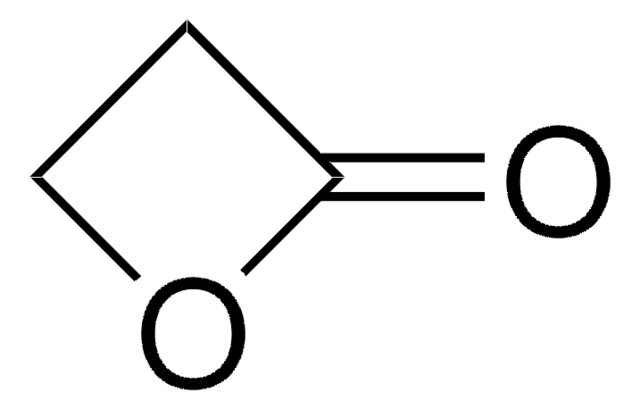219126
β-Butyrolactone
98%
Sinónimos:
beta-Butyrolactone, β-Methyl-β-propiolactone, 3-Hydroxybutyric acid β-lactone, 4-Methyl-2-oxetanone
About This Item
Productos recomendados
Quality Level
assay
98%
refractive index
n20/D 1.411 (lit.)
bp
71-73 °C/29 mmHg (lit.)
mp
−43.5 °C (lit.)
density
1.056 g/mL at 25 °C (lit.)
functional group
ester
SMILES string
CC1CC(=O)O1
InChI
1S/C4H6O2/c1-3-2-4(5)6-3/h3H,2H2,1H3
InChI key
GSCLMSFRWBPUSK-UHFFFAOYSA-N
¿Está buscando productos similares? Visita Guía de comparación de productos
General description
Application
signalword
Warning
hcodes
Hazard Classifications
Carc. 2 - Eye Irrit. 2 - Flam. Liq. 3 - Skin Irrit. 2
Storage Class
3 - Flammable liquids
wgk_germany
WGK 3
flash_point_f
140.0 °F - closed cup
flash_point_c
60 °C - closed cup
ppe
Eyeshields, Gloves, type ABEK (EN14387) respirator filter
Elija entre una de las versiones más recientes:
¿Ya tiene este producto?
Encuentre la documentación para los productos que ha comprado recientemente en la Biblioteca de documentos.
Los clientes también vieron
Chromatograms
suitable for GCsuitable for GCsuitable for GCNuestro equipo de científicos tiene experiencia en todas las áreas de investigación: Ciencias de la vida, Ciencia de los materiales, Síntesis química, Cromatografía, Analítica y muchas otras.
Póngase en contacto con el Servicio técnico











